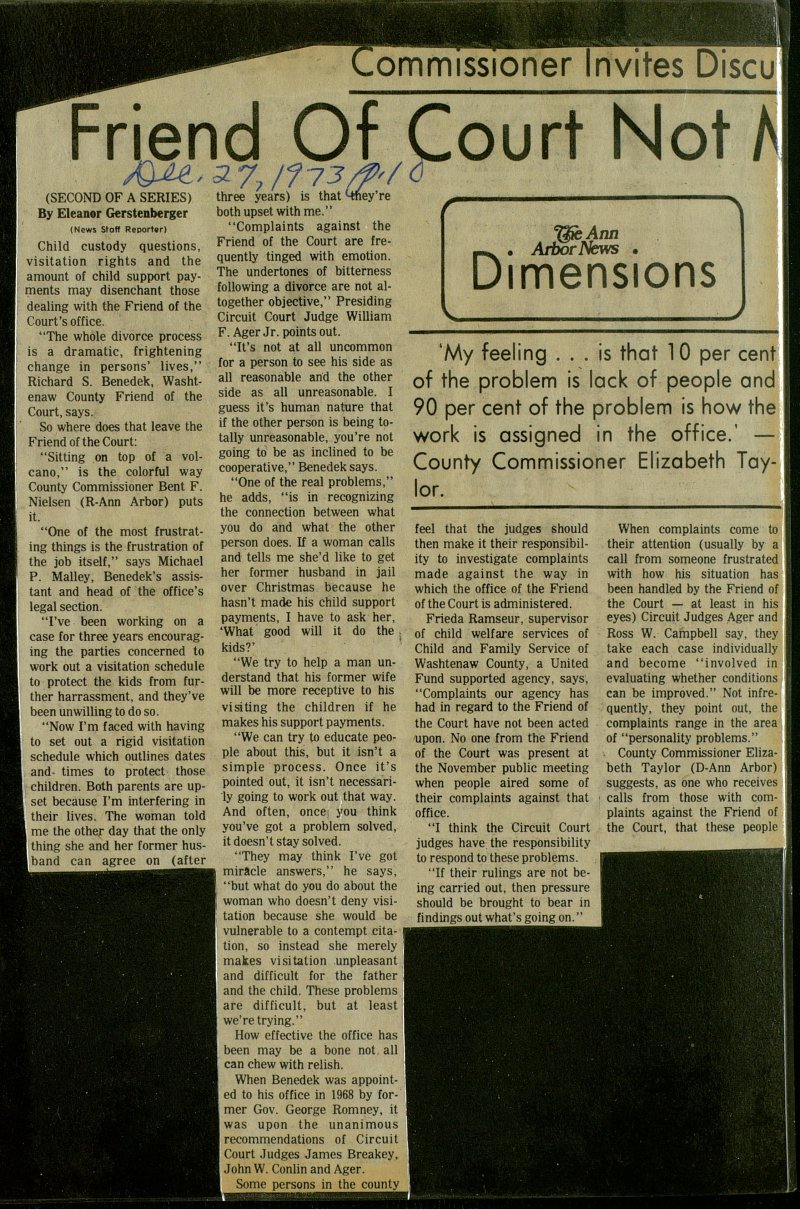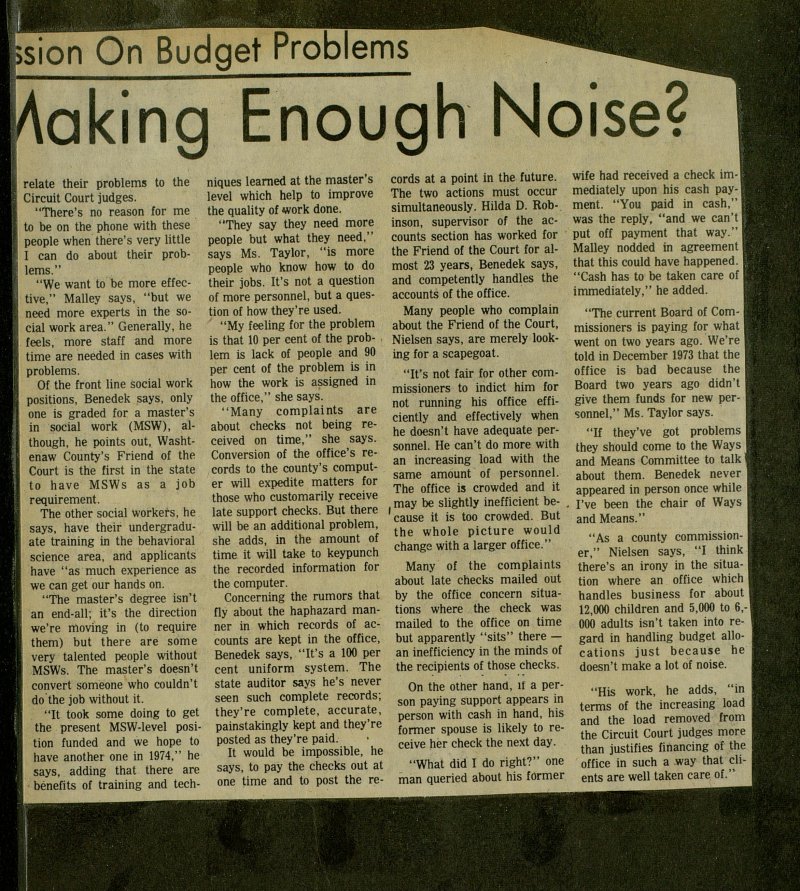Friend Of Court Not Making Enough Noise? Commissioner Invites Discussion Budget Problems


(SECOND OF A SERIES) f Child custody questions, J visitation rights and the f amount of child support payJ ments may disenchant those H dealing with the Friend of the [ Court's office. "The whole divorce process ;; is a dramatic, frightening change in persons' Uves," Richard S. Benedek, WashtI enaw County Friend of the I Court.says. So where does that leave the Friend of the Court: "Sitting on top of a vol:. cano," is the colorful way II County Commissioner Bent F. I Nielsen (R-Ann Arbor) puts "One of the most frustrat ing things is the frustration of ; the job itself," says Michael ■ P. Malley, Benedek's assis tant and head of the office's s legal section. íj "I've been working on a 'A case for three years encouragr ing the parties concerned to work out a visitation schedule ■ to protect the kids from fur'1 ther harrassment, and they've I been unwilling to do so. p; "Now I'm faced with having I to set out a rigid visitation schedule which outlines dates 1 times to protect those lm children. Both parents are up;Ji set because I'm interfering in H their lives. The woman told ■ me the other day that the only I thing she and her former husBband can agree on (after three years) is that 4ney're bothupsetwithme." "Complaints against the Friend of the Court are frequently tinged with emotion. The undertones of bitterness following a divorce are not altogether objective," Presiding Circuit Court Judge William F. Ager Jr. points out. "It's not at all uncommon for a person to see his side as all reasonable and the other side as all unreasonable. I guess it's human nature that if the other person is being totally unreasonable, you're not going to be as inclined to be cooperative," Benedek says. "One of the real problems," he adds, "is in recognizing the connection between what you do and what the other person does. If a woman calis and tells me she'd like to get her former husband in jail over Christmas because he hasn't made his child support payments, I have to ask her, 'What good will it do the kids?' "We try to help a man understand that his former wife will be more receptive to his visiting the children if he makes his support payments. "We can try to edúcate people about this, but it isn't a simple process. Once it's pointed out, it isn't necessarily going to work out that way. And often, once, you think you've got a problem solved, it doesn't stay solved. "They may think I'vè got ■ miracle answers," he says, I "but what do you do about the I woman who doesn't deny visiI tation because she would be I vulnerable to a contempt i I tion, so instead she merely 1 I makes vi si tation unpleasant I I and difficult for the father I I and the child. These problems I I are difficult, but at least I I we' re try ing." How effective the office has I been may be a bone not all I can chew with relish. ; When Benedek was appointI ed to his office in 1968 by ■ mer Gov. George Romney, it I was upon the unanimous I recommendations of Circuit I Court Judges James Breakey, I John W. Conlin and Ager. B Some persons in the county feel that the judges should then make it their responsibility to investígate complaints made against the way in which the office of the Friend of the Court is administered. Frieda Ramseur, supervisor of child welfare services of Child and Family Service of Washtenaw County, a United Fund supported agency, says, "Complaints our agency has had in regard to the Friend of the Court have not been acted upon. No one from the Friend of the Court was present at the November public meeting when people aired some of their complaints against that office. "I think the Circuit Court judges have the responsibility to respond to these problems. "If their rulings are not being carried out, then pressure should be brought to bear in findingsoutwhatsgoingonj When complaints come to I their attention (usually by a I cali from someone frustrated I with how his situation has I been handled by the Friend of I the Court - at least in his I eyes) Circuit Judges Ager and I Ross W. Campbell say, they I take each case individually I and become "involved in I evaluating whether conditions I can be improved." Not infreI quently, they point out, the I complaints range in the área I of "personality problems." County Commissioner ElizaI beth Taylor (D-Ann Arbor) I suggests, as one who receives i calis from those with com plaints against the Friend of I the Court, that these people I "QkAnn Dimensions 'My feeling ... is that 1 0 per cent I of the problem is lack of people and I 90 per cent of the problem is how the I work is assigned in the office.' - County Commissioner Elizabeth 1 lor. I relate their problems to the 1 Circuit Court judges. I "There's no reason for me I to be on the phone with these 1 people when thére's very little Ij I can do about their probII lems." t "We want to be more effeca uve," Malley says, "but we I need more experts in the solí cial work área." Generally, he I feels, more staff and more I time are needed in cases with MI problems. I Of the front line social work II positions, Benedek says, only f one is graded for a master's f', in social work (MSW), aíí though, he points out, Washt enaw County's Friend of the I Court is the first in the state sj. to have MSWs as a job é requirement. The other social workefs, he i says, have their undergraduI ate training in the behavioral l science área, and applicants i I have "as much experience as I 1 we can get our hands on. I "The master's degree isn't l an end-all; it's the direction l[ we're moving in (to require I them) but there are some H very talented people without I'1 MSWs. The master's doesn't g convert someone who couldn't H do the job without it. E "It took some doing to get I the present MSW-level posi[ tion funded and we hope to H have another one in 1974," he W says, adding that there are 1 bénefits of training and techin ñiques learned at the master's level which help to improve the quality of work done. "They say they need more people but what they need," says Ms. Taylor, "is more people who know how to do their jobs. It's not a question of more personnel, but a question of how they're used. "My feeling for the problem is that 10 per cent of the problem is lack of people and 90 per cent of the problem is in how the work is assigned in the office," she says. "Many complaints are about checks not being received on time," she says. Conversión of the office's records to the county's computer will expedite matters for those who customarüy receive late support checks. But there will be an additional problem, she adds, in the amount of time it will take to keypunch the recorded information for the computer. Concerning the rumors that fly about the haphazard manner in which records of accounts are kept in the office, Benedek says, "It's a 100 per cent uniform system. The state auditor says he's never seen such complete records; they're complete, accurate, painstakingly kept and they're posted as they're paid. It would be impossible, he says, to pay the checks out at one time and to post the cords at a point in the future. The two actions must occur simultaneously. Hilda D. Robinson, supervisor of the accounts section has worked for the Friend of the Court for almost 23 years, Benedek says, and competently handles the accounts of the office. Many people who complain about the Friend of the Court, Nielsen says, are merely looking for a scapegoat. "It's not fair for other commissioners to indict him for not running his office efficiently and effectively when he doesn't have adequate personnel. He can't do more with an increasing load with the same amount of personnel. The office is crowded and it may be slightly inefficiënt . cause it is too crowded. But the whole picture would change with a larger office." Many of the complaints about late checks mailed out by the office concern situations where the check was mailed to the office on time but apparently "sits" there - an inefficiency in the minds of the recipients of those checks. On the other hand, tí a person paying support appears in person with cash in hand, his former spouse is likely to receive her check the next day. "What did I do right?" one man queried about his former WÊÊÊÊ wife had received a check im-B mediately upon his cash pay-B ment. "You paid in cash," was the reply, "and we can'tB put off payment that way." Malley nodded in agreementl that this could have happened. I "Cash has to be taken care of I immediately," he added. "The current Board of 1 missioners is paying for what 1 went on two years ago. We're I told in December 1973 that the I office is bad because the I Board two years ago didn't I give them funds for new 1 sonnel," Ms. Taylor says. "If they've got problems I they should come to the Ways ■ and Means Committee to talk ■ about them. Benedek never I appeared in person once while I I've been the chair of Ways I and Means." "As a county 1 er," Nielsen says, "I think I there's an irony in the I tion where an office which I handles business for about I 12,000 children and 5,000 to 6,-BJ 000 adults isn't taken into I gard in handling budget I cations just because he I doesn't make a lot of noise. "His work, he adds, "in I terms of the increasing load I and the load removed from I the Circuit Court judges more I than justifies financing of the I office in such a way that cliI ents are well taken care of."
Article
Subjects
Eleanor Gerstenberger
Washtenaw County Circuit Court
Friend of the Court
Divorce
Child Custody
Child and Family Services of Washtenaw County
Ann Arbor News
Old News
William F. Ager Jr
Ross W. Campbell
Richard Benedek
Michael Malley
John W. Conlin
James Breakey
Hilda D. Robinson
Frieda Ramseur
Elizabeth Taylor
Bent F. Nielsen